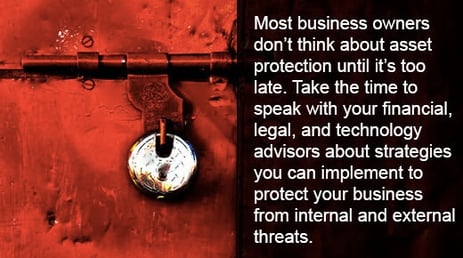Whether your industry is health care, marketing, or whatever else, asset protection is vital to your business's success. The fact is, when you own and operate a company, you naturally open yourself up to a number of risks. From the lengthy list of expenses you take on when you launch (including business loans) to the threat of lawsuit, natural disaster or product malfunctions, there’s a strong possibility that something can arise to harm you and your business. Because of the reality of these risks, it’s crucial that you take steps to minimize potential loss. By safeguarding your assets, you insulate your business from disasters, like the repercussions of faulty products, claims of harassment, or partnerships that go sour–should they happen down the road.
How to Protect Your Key Business Assets
So what goes into proper asset protection? What should you be doing to protect your firm? Step one is to start thinking about your asset protection now, before a problem occurs. According to Greene & Markley, commercial lawyers, “The very best advice is to assess your risks and take steps to protect your assets before there are any signs of financial problems. When the sun is shining and the sky is clear, you have a better chance of protecting yourself than if you wait until the storm clouds are on the horizon.” With that in mind, here’s a look at six key strategies for keeping your assets secure and your business moving forward.
- Set up an LLC or corporation. Making your business a limited liability company (LLC) or a corporation is a smart first step for reducing business risk. An LLC is designed to help you avoid personal liability for debts that your business incurs and make the business liable instead. Since there are different regulations surrounding LLCs in different states, it’s still worthwhile to get legal advice on this decision. Make sure you understand what this does and doesn’t protect in your area.
- Store important paperwork in fireproof cabinets and/or safes. One of your best protections in case of audit or lawsuit is keeping detailed, accurate records — but those records must be secure in order to be useful to you. By storing detailed records digitally and/or in fireproof cases, you ensure that you have access to them when you need them, even if unthinkable disasters occur before then. Safes can provide effective protection for high-value products, cash, or debit gift cards.
.jpg?width=450&name=1%20(1).jpg)
- Use digital video security systems. Another key way to increase the insight you have into your operations is through video security systems. Should you face claims of improper employee conduct or other behavior caught on video, you’ll have proof of what did or did not occur. This protects you against false claims with hard-and-fast evidence.
- Invest in insurance. “Asset protection planning should not be a substitute for liability and professional insurance,” says Jay Adkisson at Forbes, “but rather should supplement insurance.” So don’t make the mistake of confusing the two. Asset protection planning helps you minimize risks of lawsuits and other damages; liability insurance provides help when those lawsuits occur. Your insurance company will step in to handle your defense and settlement.
- Keep personal financial backup strategies in place. When you own a company, it’s easy to want to put all your resources into making that company succeed — but draw the line at retirement accounts. Your IRA or 401(k) is your emergency backup plan and will be protected even if your company fails at some point, so don’t touch it.
- Engage in scenario planning to highlight risks. Tim Stoll, Owner of The Alternative Board – Metro Baton Rouge says “If more businesses in New Orleans asked, ‘What if a catastrophic hurricane hit?’ they may have been better protected. We don't know what we don't know." Engaging with a peer advisory board helps Stoll analyze his business assets from every angle. “We help each other see things from a different perspective.”
- Put a business succession plan in place: According to attorney Kenneth J. Laino, “More businesses collapse from lack of a business succession plan than from a lawsuit bought by a party unrelated to the business.” So think about it: what will happen to your company if something happens to you or another executive? If you want to protect your assets, you need to get a plan in place for this situation.“Securing the intangible knowledge base that allows your company to operate is both the most important and most neglected item on this list,” says TAB San Antonio President John F. Dini. “No owner likes to anticipate the day he or she doesn’t show up for work, but it does happen. Make certain that the people you expect to step up know the roles they are expected to assume, have agreed to take them on, and have documented incentives to stick around through the transition.”

The entire concept of asset protection planning is built on the concept of worst-case scenario: you prepare for disaster, so if it happens, the results aren’t as catastrophic.
According to TAB York facilitator Philip Spensieri, “Most business owners don’t think about asset protection until it’s too late. Take the time to speak with your financial, legal, and technology advisors about strategies you can implement to protect your business from internal and external threats.”
Is your company prepared for what could go wrong? If not, why? Follow the above tips to prepare your company to survive whatever comes.
About the author:
Wes Wernette currently oversees marketing at FireKing Security Group in New Albany, IN. The company specializes in products and services to secure your business assets, including safes, cash management products and file cabinets.







